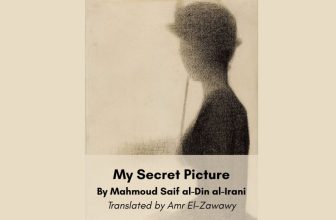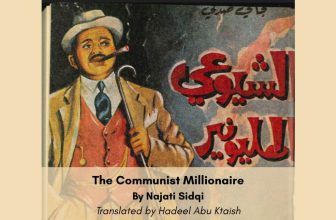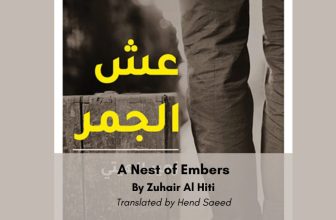
Sufyan Rajab’s Noah’s Hourglass is no ordinary East-West love affair. The fun, sharply observed novel moves between two voices—the Tunisian Belkacem and the Ukrianian Olga—as they each try to find safe harbor in an unsafe world. The pair first meet when they are young and attractive, and they come together again when Olga flees the war in Ukraine, now older, thicker in the waist, and with her disabled daughter Eliza. As they tell each other their family histories, they find they’re more entangled than they thought. A novel that brings together low farce and high poignancy, which Lena Abdel Rahman, writing in the Independent Arabia, particularly lauds for its portrait of Olga.
From Noah’s Hourglass
By Sufyan Rajab
Translated by James Scanlan
A Grain of Sand
1
Before the Flood
Every face suddenly looked like my grandfather’s, so much so that I could no longer tell two people apart. At first, this was amusing: to think that all the men sitting around me were wearing masks of old Belkacem Merzoug, but then I remembered he’d vanished before my father was born, leaving no photos behind. So his face was a creation of my imagination, which was… unnerving.
I wondered whether someone had been listening as I told Mad Noah my grandfather’s incredible story, and then if that someone had turned what I’d said about my grandfather into a mask. Is that even possible? How thrilling to think my words had become contours, colors—an articulation of the image in my mind.
I was overjoyed each time I saw my grandfather in someone else’s face. So many people looked just like him—men, women, even children.
Were they really all wearing masks?
Or was this a dream?
I was walking along the beach, and the cold waves lapping at my feet as the tide came in felt more real than any dream.
This was all… surprising.
I thought of my writer friend, Amjad the Anarchist, and his face was also my grandfather’s face.
In a moment of panic, I tried to recall the faces of other people I knew, only to find that they all looked like my grandfather.
So I took off running and screaming like a fool.
I resolved to see this as a test. And, in order to pass, I had to focus on conjuring up one face from everyone I knew—just one face that didn’t resemble my grandfather’s. But each attempt plunged me further into darkness.
What madness was this? What absurdity? What was happening to the world? To me?
Famous faces all looked like my grandfather. Lenin, Che Guevara, Trotsky, Rosa Luxemburg, Pablo Neruda, Federico García Lorca, Muthaffar al-Nawab, Gamal Abdel Nasser, Stalin, Putin, Nâzım Hikmet, and Hugo Chavez. The lot of them.
The only person who didn’t look like my grandfather was the one face I could remember with any clarity.
And that was Olga.
A Grain of Sand
2
Olga
I first met Olga at the house of Mrs Anastasia in the spring of 2009. She was a twenty-something blonde with the figure of Russian tennis player, blue eyes, and a light frosting of silvery freckles across her cheeks.
Back then, I used to bring fish to the elderly Russian lady. I would knock on the door, and her son Serge would greet me. But on that day, I was surprised to find the door opened by a beautiful blonde girl who invited me inside with accented Arabic: “Teffuzel.”
Flustered, I replied, “Fish. I have fish for Mrs Anastasia. Is she in?”
She smiled and said, “Of course! She’s just sleeping.”
I handed her the bag of fish and left.
I took her for a tourist, visiting the last of the Russian exiles who’d been driven to North Africa by the Bolsheviks.
But over the next few days, I saw her again and again. She puzzled me. Had Mrs Anastasia brought her in as a maid, perhaps to help with Serge (who had a slight mental disability)? Was she a nurse sent by the Russian embassy? Maybe a granddaughter?
One day, my curiosity got the better of me, and I asked her.
She replied: “I’m taking care of Mrs Anastasia, just as a volunteer.”
I discovered later that she was Ukrainian, not Russian as I had assumed.
This made her laugh.
“Even the Empress says I’m Russian,” she said.
(“The Empress” was Mrs Anastasia.)
“Like all Russians who knew the Russian Empire, she thinks of Ukraine as a Russian province.”
I grew closer and closer to Olga, and we began meeting up in cafes near the old port. I learned that she was from a city called Debaltseve, near the border between the Ukraine and Russia, and had come to Tunisia to study Arabic at the Bourguiba Institute for Modern Languages.
“Why did I come to the East? I came in search of truth.”
“And what truth are you looking for?”
“In a dream, I saw a goddess pointing toward the East. She was telling me to travel.”
“But why Tunisia?”
“My priestess, Zhenya, told me to go to North Africa—Morocco, Tunisia, or Egypt. And I chose Tunisia.”
Mrs Anastasia died in late 2009, just a couple of months after celebrating her ninety-seventh birthday. She was laid to rest in the Christian cemetery in Bizerte.
Olga eventually left our city and settled in Tunis after which we’d meet only once a week, on Sunday, when she came to visit Anastasia’s grave. We’d lay flowers for Anastasia and then spend the day walking between the old port and the old city.
In the spring of 2011, she announced that she was returning to Ukraine. Not that she gave me much time to process this—she called me the day before she left. We stayed in touch for the next three years by phone and over Facebook. Then, just like that, all communication stopped.
And then, at the beginning of this year, out of the blue, she messaged me:
“Ukraine will be at war in a few days. I’m coming to Tunisia. Can I stay with you, just temporarily?”
I wrote back, “You are most welcome, Olga,” which I sent with a heart emoji.
She replied simply, “Thank you.”
I followed this with a bombardment of questions: “How are you?” “Where have you been?” “Are you married?” “Did you find the truth you were seeking?”
Her reply was curt: “Belkacem, we’ll talk when we see each other in Tunisia.”
Days went by with no further word from her. I sent countless messages on Facebook and WhatsApp (all unanswered), and I began to worry that she’d disappeared again like she had before.
But then she messaged again:
Hello, Belkacem.
My plane will arrive at Carthage Airport tomorrow at six in the morning.
I hope you will be there.
It was brief. It was enigmatic. And yet—and yet—it was laced with hope, because the day of Olga’s arrival would be the 174th anniversary of the publication of The Communist Manifesto. Monday, February 21, 2022. Also, her journey mirrored that of Anastasia’s a century before. And Anastasia had been the beloved of my grandfather Belkacem, Tunisia’s first communist.
Revolutions often begin with enigmatic messages, I mused. Like the letter from Inessa to Lenin before his return to Moscow, or from Isabel to Castro before his voyage from Mexico to Havana.
I convinced myself that Olga’s message was the herald of my own impending revolution.
With that thought in mind, I set off in my red jeep to meet her at Carthage Airport.
A Grain of Sand
3
Belkacem
I wandered in and out of the airport for over an hour, but I couldn’t find Olga. I scanned the faces of the people coming and going, glancing at my phone in case she’d messaged to say she’d arrived.
Then a large blonde woman approached, like she’d stepped right out of a Fernando Botero painting. She was pushing a wheelchair in which sat a little girl.
The woman stopped in front of me and opened her arms wide.
“Hello, Belkacem.”
I didn’t know what to say—it was Olga.
“Have I really changed that much? I guess I have.”
I finally regained my composure and went toward her, arms open.
“Oh Olga, these are cruel times. We’ve all changed.”
As we hugged, she said, “You haven’t changed; you’re still strong and handsome.”
Her embrace was cold and short. She stepped back and gestured at the girl in the wheelchair.
“This is my daughter, Eliza. She’s all I have. You can see for yourself that she’s in a wheelchair. But she’s a dreamer, and her dreams are always of flying. She’s American, but she also has her mom’s nationality. And she plays the balalaika really well.”
This flurried introduction to her daughter was the most Olga had said. She bent down to the girl and said in English, “This is Uncle Belkacem.”
On the way to Bizerte, I kept thinking about what connected me to Olga. Surely there was nothing between us save the initial spark of a relationship extinguished by time.
I’ll admit that I had rushed out to meet her like a flood—and was met with a barrier of ice.
This once-gorgeous girl, full of mystery, was now… a large lady. There were still hints of her past beauty, but the mystique had frozen over.
“Ugh! It’s so hot!” she said, removing her long brown coat.
I chuckled in disbelief.
“All this iciness and you complain of the heat!!”
She ignored my remark. She said nothing at all and looked out the car window, absorbed in the suburban scenes flashing by. In the back seat, Eliza quietly clutched her strange, triangular guitar. She smiled every time our eyes met in the rear-view mirror. Her eyes were a shade bluer than her mother’s, and she seemed generally more cheerful.
What was her story? Was she the product of some brief fling?
Olga had insisted in the past that she was against having children—what had changed?
Push those thoughts aside, Guevara! This woman is escaping hell—she’s fleeing to you. She’s left her fellow Ukrainians at the mercy of Russian artillery that could open its deadly jaws any day now.
I said that the news was downplaying the possibility of war.
“Ha! Nonsense. Forget the media. We Ukrainians know the war is coming—if it hasn’t already started.”
And she added, “Russia’s new emperor doesn’t joke.”
“Russia’s new emperor?”
“Putin.”
I thought: Well, she’s still holding on to her old anti-communist ideas.
I looked at her again and saw tattoos on her forearms—eagles and snakes entwined around a star inside a circle. She looked like one of those Eastern European escorts who go with Russian tourists to Tunisia.
It made me sad to think of what she’d become. I felt some regret, too, at the thought that I was providing refuge for this ahira—this prostitute—with her damaged fruit, punished by nature. No, Guevara! No, no! You can’t say that. That’s not fair. How can you judge someone based on how they look?
She’s probably the victim of dirty capitalist schemes, just like everyone else. Hear her story first, then form your opinions.
You’re rescuing your beloved, Guevara! Saving her from the clutches of capitalism! No revolutionary can live without someone to love. Olga coming back to you is the sign that the revolution you’ve always dreamed of is here.
In the mirror, I saw that Eliza had closed her eyes.
“I think your daughter has fallen asleep.”
“Let her sleep,” Olga replied softly. “The poor thing isn’t used to traveling by plane.”
This was my opportunity.
“What’s Eliza’s story?” I asked.
“It’s a long one. But we have plenty of time.”
Sufyan Rajab is a multi-award-winning Tunisian poet, novelist, short-story writer, and journalist. He is the author of three collections of poetry, three short-story collections, and four novels. He’s been a finalist for several prestigious literary prizes, including the Multaqa Prize for the Arabic Short Story in 2019 the International Prize for Arabic Fiction in 2024.
James Scanlan is an an Arabic-to-English translator from the UK based in Egypt. You can watch him read from an excerpt of his translation of Muhamad A Jamal’s Flying in a video produced for the Bila Hudood festival in 2021. He won the 2022 ArabLit Story Prize.







